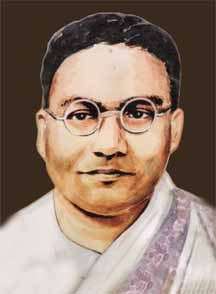
Dalit History Month – Remembering Jogendra Nath Mandal
Today in Dalit History we focus on the powerful legacy of freedom fighter Jogendra Nath Mandal. His crucial role in the founding of India and Pakistan came from his strategic position as the significant Namashudra leader of United Bengal.
As the Indian subcontinent was moving towards independence, Dr. B.R Ambedkar and the Congress Party of India clashed bitterly over the rights and representation of scheduled castes. Ambedkar was an unyielding critic of the Congress party’s positions on many issues, which he believed were not in the interest of the scheduled castes. Thus when members were being elected to the Indian Constituent Assembly, the Congress party in Bombay saw to it that Dr. Ambedkar was not elected. However, Jogendra Nath Mandal, who had been nominated from Jaisur and Kulna (undivided Bengal), sacrificed his seat to Dr. Ambedkar so that he could become part of the 296 member constituent Assembly. In doing so, Mandal ensured there was at least one Dalit present in the drafting committee of the Indian constitution.
As a leader of the Namashudras, Mandal found common cause with the Muslim League, in their demand for Pakistan. His reasons were, “First the economic interests of Muslims in Bengal were generally identical with those of the Scheduled Castes…and secondly that the Scheduled Castes and the Muslims were both educationally backward.” He hoped that in Pakistan, Dalits would be equal, as freedom from the oppression of Caste Hindu landlords and moneylenders would cease. For M.A. Jinnah, the 1st leader of ‘Pakistan’ had assured them the freedom to practice any religion; In his speech of August 11, 1947 he said, “You are free; you are free to go to your temples. You are free to go to your mosques or to any other places of worship in this State of Pakistan. You may belong to any religion, caste or creed—that has nothing to do with the business of the State.” Thus on August 15, 1947 Mandal became a member and a temporary chairman of Pakistan’s Constituent Assembly and agreed to serve as the Minister for Law and Labour. He also served as the second minister of commonwealth and Kashmir affairs.
Sadly, his time in Pakistan was not peaceful as he could not stop the increasing violence against Dalits in the country. First, his demand to have two more Dalit members as ministers was also ignored by Liaquat Ali Khan, then Prime minister of Pakistan. Second, he countered the proposed Objectives Resolution that defined Pakistan, an Islamic state, which disregarded the rights of ethnic and religious minorities. Later in October 1950, he resigned and went to Calcutta (now Kolkata) in independent India.
Mandal later tried to enter the Indian political sphere in 1967 but failed in his attempt as he was one of the founding members of Pakistan. He contested in the Barasat constituency in the year 1967 and was defeated. Jogendra Nath Mandal died on 5 October 1968 at the age of 64 years in Bangaon in the state of West Bengal, India.
Check also – 29th January in Dalit History – Birth Anniversary of Jogendranath Mandal




